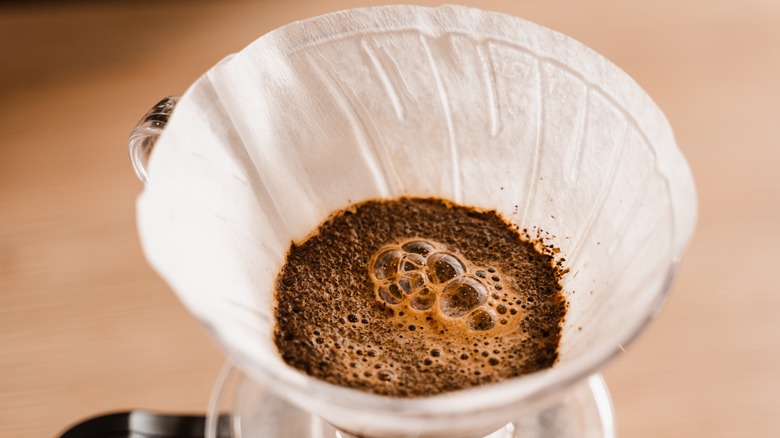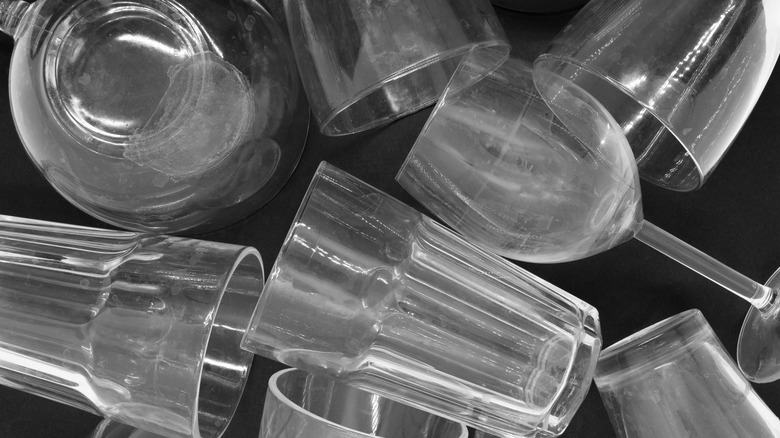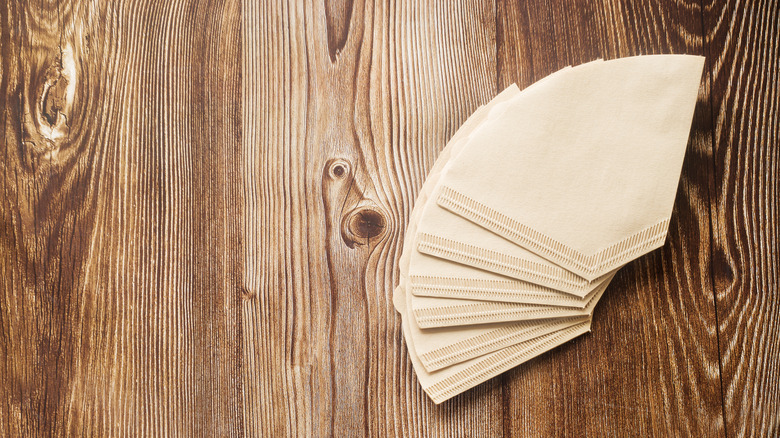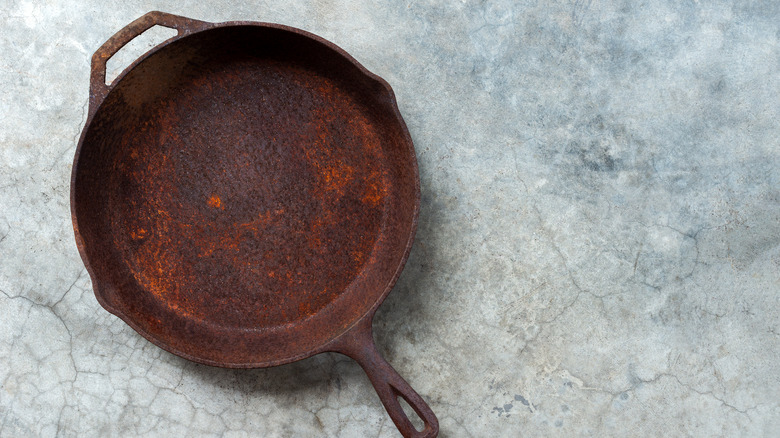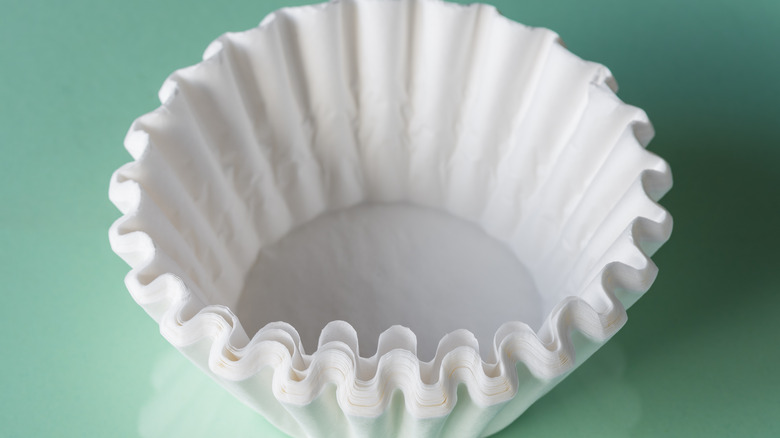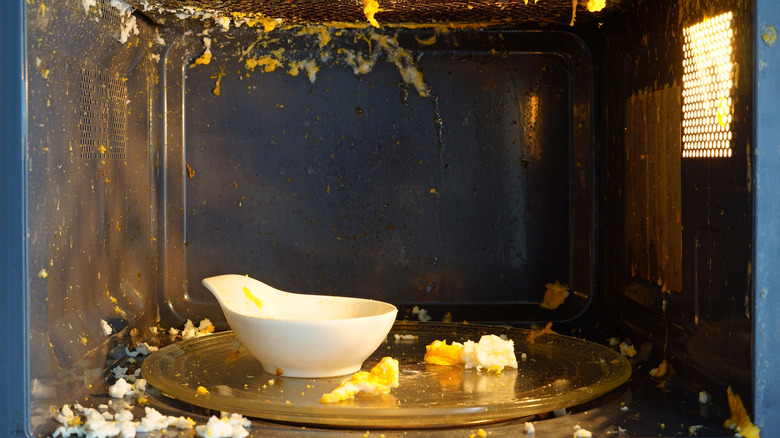Coffee Filters Are Actually Handy For Cleaning Your Kitchen
Coffee filters are essential for brewing hot java with drip coffee makers at home. However, you may not know they are massively under-utilized little things that can be used for numerous other purposes. The filters are made from cellulose fibers that are pressed together tightly to form paper, ensuring the filters can trap wet coffee grounds while still allowing essential oils and flavors present in the beans to pass through. A coffee filter's woven texture, absorbent material, lint-free nature, and conical shape make them handy for cleaning things around the house, including the kitchen.
The cellulose fibers coffee filters are made from are similar to those found on cleaning cloths used to dust surfaces; their texture can help remove smudges from glassware and appliances. Plus, their absorbent nature makes them great for soaking up excess grease. Even if you don't brew coffees that require you to have a ready supply of coffee filters at home, you might still find a use for them upon discovering how these nifty little things are handy, versatile cleaning supplies — and should be stocked up on nonetheless.
Clean glassware and stainless steel with coffee filters
No one likes to see fingerprint smudges or cloudy spots of dry water when drinking from a glass. Worse still are those spots of lint or fibers, which are often left behind from hastily dried glasses with cloth. All of this can end up dotting what should be crystal clear and sparkling glassware with streaks of white. Here's where your handy new cleaning cloth comes into play: Coffee filters dry glassware without leaving water spots, and they can also polish and buff those glasses without leaving any traces of lint behind.
To try this method, pick up a coffee filter and begin drying at the bottom of the glass before working your way up and finally cleaning the insides, replacing it every ten glasses. The same goes for stainless steel: Coffee filters can polish this material and make it shine without leaving any smears or streaks behind.
In essence, you can use the filters as cleaning rags to wipe your stainless steel plates, cutlery, pots, pans, and even kitchen sinks and taps. As a bonus, the texture of coffee filters allows them to work as gentle scrubbers that remove mineral stains on glasses and stainless steel kitchen sinks and taps.
Use coffee filters to absorb grease
One of the nastiest and most stubborn things to clean in the kitchen are cooking oil spills and pools of grease. Luckily, coffee filters can prevent them from happening in the first place, saving you all that elbow grease. As coffee filters are composed of highly absorbent materials, they can also soak up excess oil and grease.
Use filters like paper towels to line plates and bowls — or even tiffin boxes and containers — before putting greasy foods in them to soak up any oil. You could even use coffee filters as blotting papers to pat fried foods and remove excess oil instead of paper towels. Coffee filters' ability to absorb greasy liquids also allows them to work in a pinch when you're in the middle of cooking and need a place to rest your spoons and ladles. Rather than using a clean plate or bowl to catch the drips, you can rest the utensils on a coffee filter and throw the filters out afterward.
Coffee filters can keep cast iron rust-free
There are several reasons why cast iron cookware is so sought after. It is affordable, sturdy, and durable enough to last for generations. Plus, it holds and regulates heat exceptionally well, it can turn into a non-stick surface when seasoned, and is easy to clean... for the most part. However, there is one primary concern with cast iron cookware: The material tends to rust. While cast iron cookware can be easily cleaned with water, long periods of exposure to water can quickly cause it to rust. Fret not, for coffee filters will always come to the rescue.
After you've washed, dried, and seasoned cast iron pots and pans with a layer of oil, stick a sheet of coffee filters over them. While the oil works to seal cast iron from outside moisture, coffee filters will absorb excess humidity and moisture that still lingers in the air, providing an extra layer of protection. Layering cast iron pots and pans (or any cookware or dinnerware, for that matter) with coffee filters will also prevent scratches from forming if stacked one upon the other.
To make things better, you can season the cast iron cookware with the help of coffee filters: Dip a filter in oil and rub it all over the pots and pans without making a mess of your hands.
Make a DIY air freshener out of coffee filters
Coffee grounds are exceptional natural deodorizers. They can remove foul odors from clothes, cars, and even refrigerators. But did you know that, with some DIY effort, coffee filters can be turned into air fresheners? As previously mentioned, coffee filters are designed to filter oils and flavors while trapping wet grounds within, which means they can also be used as pouches to hold deodorizing materials.
All you need to do is pour some baking soda — which is excellent at absorbing and neutralizing odor — into a coffee filter and tie the top with a string or a rubber band. Even better, the conical or basket-like shape of a coffee filter makes it easier to turn it into a bag of air fresheners, which opens one way to achieve a cleaner refrigerator by neutralizing smelly odors. The same logic applies to stinky kitchen sinks. You could even stash some sweet spices and dried herbs like lavender, cinnamon, and cloves with the baking soda, depending on where in the kitchen you'd like to place your new DIY air freshener.
Coffee filters can prevent microwave splatters
A microwave makes heating cold leftovers a breeze. However, if you make the mistake of leaving them uncovered, you'll potentially have a huge problem on your hands instead. The food will splatter all over your microwave, leaving a time-consuming mess to clean up.
If you use a coffee filter to cover your food, you can easily prevent the explosion from happening. Unlike the chemicals in plastic wraps or paraffin on wax papers, which are unsuitable to be used in high heat, coffee filters happen to be perfectly safe for use in a microwave.
Covering food with a coffee filter will prevent splatters in the microwave, but if you find an odd stain somewhere, the filter can take care of that, too. Place a wet coffee filter inside a microwave and turn it on for 15 seconds. Once the food stains loosen up and the filter cools down enough to hold it, you should be able to wipe the splatters right off with the damp filter like you would with a cleaning cloth.

